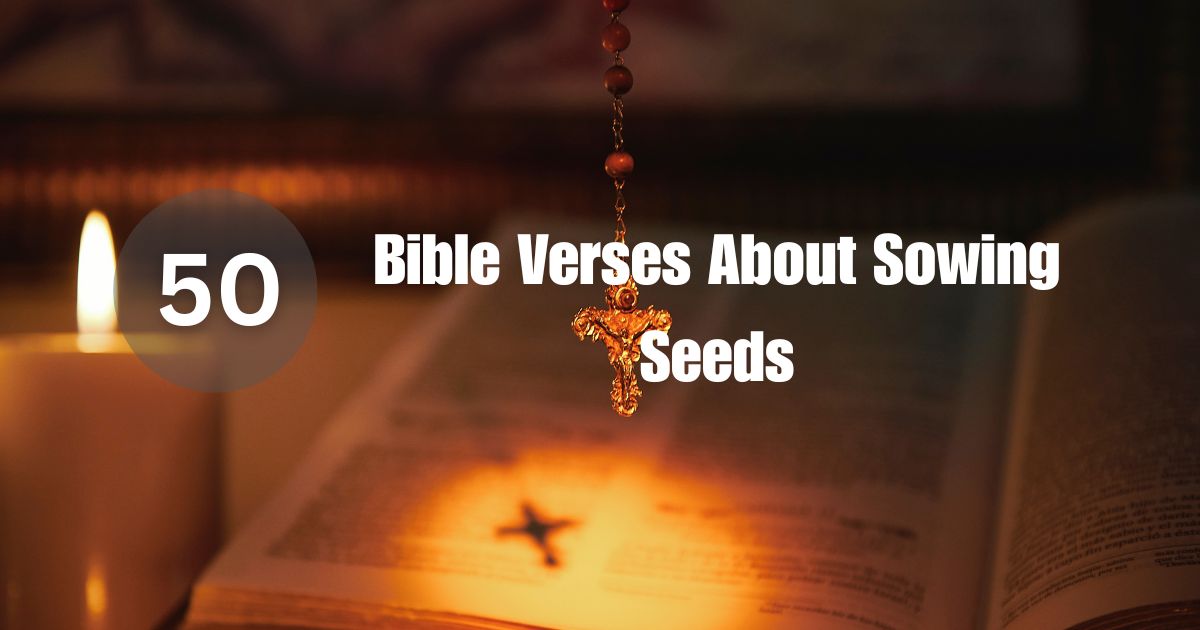Many people searching for Bible verses about sowing seeds are carrying silent burdens. Some are waiting patiently for a breakthrough. Others are working hard, giving generously, or praying with faith that feels tested.
I believe the Word of God offers more than comfort in these moments. It reveals timeless truths about effort, growth, and the promise of a harvest that only God can bring.
This article offers handpicked Bible verses that reveal how small, faithful actions can lead to meaningful spiritual growth. You will find clear insights, real encouragement, and practical truth to strengthen your walk with God.
What Does The Bible Say About Sowing Seeds?
The Bible speaks deeply about the power of sowing seeds, both in the natural and spiritual sense. It teaches that every action, whether good or bad, is a seed that brings a future harvest. Galatians 6:7 says, “Do not be deceived: God is not mocked, for whatever one sows, that will he also reap.” This verse reminds us that our choices have lasting consequences, encouraging us to plant seeds of faith, kindness, and righteousness.
Sowing seeds in Scripture often reflects trust in God’s timing and promises. It takes patience, faith, and consistency to see the results. Ecclesiastes 11:6 encourages this by saying, “In the morning sow your seed, and at evening withhold not your hand, for you do not know which will prosper, this or that, or whether both alike will be good.” The Bible urges believers to keep sowing good seeds faithfully, believing that God will bring the harvest in His perfect way.
Sowing Seeds with Faith and Obedience
Sowing is not only about planting physical crops. In the Bible, it represents trusting God with your actions, giving generously, sharing truth, and living righteously, even when the outcome is unseen. This section helps us understand how Scripture calls us to sow in faith, follow in obedience, and trust the process God has designed.
Galatians 6:7
“Be not deceived; God is not mocked: for whatsoever a man soweth, that shall he also reap.”
Explanation: This verse is a strong reminder that every action has a consequence. When we sow in obedience, we can expect a righteous harvest. God sees every seed — whether good or bad, and He will bring the results in His timing. It encourages believers to live with purpose and integrity.
Luke 8:11
“Now the parable is this: The seed is the word of God.”
Explanation: Jesus explains that the seed being sown is the Word itself. Sharing Scripture is a form of spiritual sowing that can lead to transformation in others. This verse highlights the power and responsibility of spreading God’s truth. The harvest depends on both the heart of the hearer and the faithfulness of the sower.
Hosea 10:12
“Sow to yourselves in righteousness, reap in mercy; break up your fallow ground: for it is time to seek the Lord, till he come and rain righteousness upon you.”
Explanation: Here, sowing in righteousness is directly connected to receiving mercy. It calls believers to prepare their hearts and turn toward God. Just like breaking hard soil, spiritual renewal takes work and intention. The promise is clear, God will respond with blessing when we seek Him sincerely.
Ecclesiastes 11:6
“In the morning sow thy seed, and in the evening withhold not thine hand: for thou knowest not whether shall prosper, either this or that, or whether they both shall be alike good.”
Explanation: This verse speaks to consistency and trust. When you sow diligently and keep working, you leave the results to God. It teaches us not to be passive or overthink outcomes but to remain faithful in doing good. Sowing with steady hands often leads to unseen fruit.
Matthew 13:3
“And he spake many things unto them in parables, saying, Behold, a sower went forth to sow.”
Explanation: Jesus begins a powerful teaching with this image of a sower. It reminds us that spiritual growth starts with intentional effort. The act of sowing represents obedience and faith, even when we cannot control the ground. The verse sets the stage for deeper truths about sowing with purpose.
Proverbs 11:18
“The wicked worketh a deceitful work: but to him that soweth righteousness shall be a sure reward.”
Explanation: This verse draws a contrast between the dishonest and the faithful. Sowing righteousness leads to guaranteed spiritual rewards. It confirms that doing good, even quietly, matters to God. The harvest is sure, even when others may seem to prosper temporarily.
2 Corinthians 9:10
“Now he that ministereth seed to the sower both minister bread for your food, and multiply your seed sown, and increase the fruits of your righteousness.”
Explanation: God provides both the seed and the harvest. When we sow generously and with right motives, He multiplies it for our benefit and His glory. This verse assures believers that God supports those who give in faith. The increase goes beyond material and touches eternal impact.
Matthew 13:24
“Another parable put he forth unto them, saying, The kingdom of heaven is likened unto a man which sowed good seed in his field.”
Explanation: The good seed represents truth, purpose, and intentional living. In God’s kingdom, what you plant matters. This verse reminds us to be careful about what we sow, because the field belongs to God. Sowing good seed brings a harvest that aligns with His will.
James 3:18
“And the fruit of righteousness is sown in peace of them that make peace.”
Explanation: Righteousness does not grow in chaos. It is planted and cultivated in peaceful hearts. This verse highlights the link between inner peace, external behavior, and spiritual fruit. Those who sow in peace bring lasting goodness into the world.
Job 4:8
“Even as I have seen, they that plow iniquity, and sow wickedness, reap the same.”
Explanation: Job gives a hard truth here, wicked actions produce painful consequences. The verse stands as a warning against careless or sinful choices. It fits perfectly in the sowing theme by showing the danger of planting what God never approved. Reaping is inevitable, good or bad.
Sowing Seeds with Faith and Obedience
Sowing is not only about planting physical crops. In the Bible, it represents trusting God with your actions, giving generously, sharing truth, and living righteously, even when the outcome is unseen. This section helps us understand how Scripture calls us to sow in faith, follow in obedience, and trust the process God has designed.
Galatians 6:7
“Be not deceived; God is not mocked: for whatsoever a man soweth, that shall he also reap.”
Explanation: This verse is a strong reminder that every action has a consequence. When we sow in obedience, we can expect a righteous harvest. God sees every seed — whether good or bad — and He will bring the results in His timing. It encourages believers to live with purpose and integrity.
Luke 8:11
“Now the parable is this: The seed is the word of God.”
Explanation: Jesus explains that the seed being sown is the Word itself. Sharing Scripture is a form of spiritual sowing that can lead to transformation in others. This verse highlights the power and responsibility of spreading God’s truth. The harvest depends on both the heart of the hearer and the faithfulness of the sower.
Hosea 10:12
“Sow to yourselves in righteousness, reap in mercy; break up your fallow ground: for it is time to seek the Lord, till he come and rain righteousness upon you.”
Explanation: Here, sowing in righteousness is directly connected to receiving mercy. It calls believers to prepare their hearts and turn toward God. Just like breaking hard soil, spiritual renewal takes work and intention. The promise is clear, God will respond with blessing when we seek Him sincerely.
Ecclesiastes 11:6
“In the morning sow thy seed, and in the evening withhold not thine hand: for thou knowest not whether shall prosper, either this or that, or whether they both shall be alike good.”
Explanation: This verse speaks to consistency and trust. When you sow diligently and keep working, you leave the results to God. It teaches us not to be passive or overthink outcomes but to remain faithful in doing good. Sowing with steady hands often leads to unseen fruit.
Matthew 13:3
“And he spake many things unto them in parables, saying, Behold, a sower went forth to sow.”
Explanation: Jesus begins a powerful teaching with this image of a sower. It reminds us that spiritual growth starts with intentional effort. The act of sowing represents obedience and faith, even when we cannot control the ground. The verse sets the stage for deeper truths about sowing with purpose.
Proverbs 11:18
“The wicked worketh a deceitful work: but to him that soweth righteousness shall be a sure reward.”
Explanation: This verse draws a contrast between the dishonest and the faithful. Sowing righteousness leads to guaranteed spiritual rewards. It confirms that doing good even quietly, matters to God. The harvest is sure, even when others may seem to prosper temporarily.
2 Corinthians 9:10
“Now he that ministereth seed to the sower both minister bread for your food, and multiply your seed sown, and increase the fruits of your righteousness.”
Explanation: God provides both the seed and the harvest. When we sow generously and with right motives, He multiplies it for our benefit and His glory. This verse assures believers that God supports those who give in faith. The increase goes beyond material and touches eternal impact.
Matthew 13:24
“Another parable put he forth unto them, saying, The kingdom of heaven is likened unto a man which sowed good seed in his field.”
Explanation: The good seed represents truth, purpose, and intentional living. In God’s kingdom, what you plant matters. This verse reminds us to be careful about what we sow, because the field belongs to God. Sowing good seed brings a harvest that aligns with His will.
James 3:18
“And the fruit of righteousness is sown in peace of them that make peace.”
Explanation: Righteousness does not grow in chaos. It is planted and cultivated in peaceful hearts. This verse highlights the link between inner peace, external behavior, and spiritual fruit. Those who sow in peace bring lasting goodness into the world.
Job 4:8
“Even as I have seen, they that plow iniquity, and sow wickedness, reap the same.”
Explanation: Job gives a hard truth here, wicked actions produce painful consequences. The verse stands as a warning against careless or sinful choices. It fits perfectly in the sowing theme by showing the danger of planting what God never approved. Reaping is inevitable, good or bad.
Find Out More : 50 Powerful Bible Verses About Choices
Reaping What You Sow
The Bible clearly teaches that sowing is not separate from reaping. Every seed planted in faith, love, or obedience will produce something in return, good or bad. This principle is spiritual law, not just farming logic. God wants believers to understand the weight of every choice, word, and action. These verses explain how the harvest we receive is often shaped by the heart and intention behind the seeds we plant.
2 Corinthians 9:6
“But this I say, He which soweth sparingly shall reap also sparingly; and he which soweth bountifully shall reap also bountifully.”
Explanation: Paul reminds us that the measure we use in sowing is the measure we will experience in return. Holding back generosity or faith leads to limited results. But those who sow freely, with open hands and hearts, receive a rich harvest. God sees both the quantity and quality of what we give. Bountiful sowing reflects trust in His provision.
Proverbs 22:8
“He that soweth iniquity shall reap vanity: and the rod of his anger shall fail.”
Explanation: This verse warns against sowing injustice or evil. The harvest that follows such choices is empty and damaging. Anger, pride, or corruption may seem powerful for a season, but they eventually collapse. God makes it clear: wrongdoing does not produce lasting fruit. Sowing iniquity leads to destruction, not satisfaction.
Isaiah 32:20
“Blessed are ye that sow beside all waters, that send forth thither the feet of the ox and the ass.”
Explanation: Those who sow faithfully in many places are called blessed. The image here shows generosity and spiritual diligence. Whether the ground seems promising or not, the faithful sower keeps planting. This verse encourages believers not to limit their efforts based on visible results. Fruit often appears where we least expect it.
Matthew 13:8
“But other fell into good ground, and brought forth fruit, some an hundredfold, some sixtyfold, some thirtyfold.”
Explanation: Jesus speaks of seed falling into good soil, a heart ready to receive and grow the Word. The harvest varies, but the increase is guaranteed. This verse teaches that not all efforts bring the same result, but every faithful seed bears fruit. It is God who determines the outcome, and His return always multiplies beyond our effort.
Genesis 26:12
“Then Isaac sowed in that land, and received in the same year an hundredfold: and the Lord blessed him.”
Explanation: Isaac planted during a time of famine, yet God blessed his obedience with incredible increase. This verse proves that our environment does not limit God’s ability to bless. When we obey and sow in faith, He can bring results beyond human expectation. Sowing under pressure often leads to miraculous harvests.
Jeremiah 12:13
“They have sown wheat, but shall reap thorns: they have put themselves to pain, but shall not profit: and they shall be ashamed of your revenues because of the fierce anger of the Lord.”
Explanation: This verse reveals the danger of false motives. When people act religious but live in rebellion, their sowing becomes empty. The result is pain, shame, and fruitlessness. God looks beyond the act and into the heart. Sowing without true devotion leads to a harvest of disappointment, not blessing.
Job 31:8
“Then let me sow, and let another eat; yea, let my offspring be rooted out.”
Explanation: Here, Job speaks with deep conviction about his integrity. He says that if he is guilty, then he deserves to sow in vain. The verse shows that reaping is connected to personal righteousness. It also reflects a powerful truth: unjust sowing can forfeit future blessing. Honest sowing protects both the sower and their legacy.
Matthew 13:23
“But he that received seed into the good ground is he that heareth the word, and understandeth it; which also beareth fruit, and bringeth forth, some an hundredfold, some sixty, some thirty.”
Explanation: Jesus explains that true growth comes from hearing and understanding the Word. When the heart is soft and ready, the seed produces abundant fruit. This verse confirms that spiritual harvest requires both receiving and responding. It is not enough to hear — obedience is the soil where fruit takes root.
Leviticus 25:3
“Six years thou shalt sow thy field, and six years thou shalt prune thy vineyard, and gather in the fruit thereof.”
Explanation: This command shows the balance between work and rest. God allowed six years of sowing and reaping, then called for a sabbath year. It teaches that sowing is a long-term process that requires cycles of faith and patience. Obedience to God’s rhythm brings sustained provision and peace.
Psalm 126:5
“They that sow in tears shall reap in joy.”
Explanation: This verse speaks to the pain of faithful obedience during hard seasons. Sometimes we sow in brokenness, discouragement, or loss. But God promises that our tears will not be wasted. What is planted in sorrow will one day return in celebration. Joy comes when God redeems every painful seed sown in faith.
Sowing Generously and With Purpose
God values the heart behind every seed. Whether we sow kindness, finances, love, or truth, doing so intentionally and generously is a mark of spiritual maturity. Scripture teaches that generous sowing brings not only provision but deep joy, eternal reward, and alignment with God’s will. This section reminds us that the seed we plant is most powerful when driven by purpose and poured out from the heart.
Luke 6:38
“Give, and it shall be given unto you; good measure, pressed down, and shaken together, and running over, shall men give into your bosom. For with the same measure that ye mete withal it shall be measured to you again.”
Explanation: Generosity triggers divine multiplication. Jesus promises that when we give freely, we will receive back far more, not just spiritually, but often in practical ways. God honors the measure we use. The more open-handed we are, the more we experience the overflow of His provision.
Ecclesiastes 11:6
“In the morning sow thy seed, and in the evening withhold not thine hand: for thou knowest not whether shall prosper, either this or that, or whether they both shall be alike good.”
Explanation: This verse encourages consistency and effort. You may not see instant results, but God honors faithfulness. Morning and evening sowing reflect commitment, trusting God to decide where growth will come. Don’t hold back your good works, even when results feel uncertain.
Proverbs 11:24
“There is that scattereth, and yet increaseth; and there is that withholdeth more than is meet, but it tendeth to poverty.”
Explanation: God’s economy works differently than ours. When we scatter generously, we don’t lose, we increase. But when we hoard or hesitate to give, we experience lack. This proverb proves that generosity brings growth, not loss, when God is the source of all increase.
Proverbs 11:25
“The liberal soul shall be made fat: and he that watereth shall be watered also himself.”
Explanation: Giving refreshes others, and in return, refreshes us. This verse shows that a generous spirit is rewarded with strength, joy, and blessing. As we pour into others, God pours into us. Our generosity creates a cycle of blessing that never runs dry.
Hosea 10:12
“Sow to yourselves in righteousness, reap in mercy; break up your fallow ground: for it is time to seek the Lord, till he come and rain righteousness upon you.”
Explanation: God calls His people to prepare their hearts like soil. Sowing in righteousness leads to mercy, grace, and divine favor. This verse challenges us to remove hardness from our lives and actively seek God. True sowing begins with spiritual surrender.
Galatians 6:8
“For he that soweth to his flesh shall of the flesh reap corruption; but he that soweth to the Spirit shall of the Spirit reap life everlasting.”
Explanation: Paul contrasts two kinds of sowing: one leads to death, the other to eternal life. When we live to please ourselves, we harvest ruin. But when we live by the Spirit, we find lasting fulfillment. This verse calls for intentional living with eternal vision.
Philippians 4:17
“Not because I desire a gift: but I desire fruit that may abound to your account.”
Explanation: Paul speaks of giving not as a transaction, but as a spiritual investment. He wanted the Philippians’ generosity to be credited in heaven. This verse shows that giving is never wasted, it multiplies in unseen, eternal ways. Every generous seed bears heavenly fruit.
Deuteronomy 15:10
“Thou shalt surely give him, and thine heart shall not be grieved when thou givest unto him: because that for this thing the Lord thy God shall bless thee in all thy works, and in all that thou puttest thine hand unto.”
Explanation: Giving should be joyful, not burdensome. God doesn’t only look at what you give, He sees how you give it. This verse teaches that cheerful generosity invites blessing into every part of life. It connects open-handed living with divine favor and success.
2 Corinthians 9:10
“Now he that ministereth seed to the sower both minister bread for your food, and multiply your seed sown, and increase the fruits of your righteousness.”
Explanation: God is the one who provides both the seed and the harvest. He not only meets our needs but enlarges our capacity to bless others. This verse encourages us that as we sow, He multiplies both our provision and our spiritual impact. Our giving grows beyond us.
Romans 12:13
“Distributing to the necessity of saints; given to hospitality.”
Explanation: This short verse reflects the heart of sowing: meeting needs and showing love. Sharing what we have is not just a duty, it’s part of Christian identity. Generosity connects us with others, builds community, and spreads God’s kindness in practical ways.
The Power of the Seed
Every act of obedience, faith, or kindness is a seed with divine potential. God has built spiritual laws into the universe where what we sow, in word, deed, or spirit multiplies. The seed may look small, but in God’s hands, it becomes something greater. This section reveals how powerfully God uses even the tiniest seed of faith, time, or truth to produce transformation.
Mark 4:31–32
“It is like a grain of mustard seed, which, when it is sown in the earth, is less than all the seeds that be in the earth:
But when it is sown, it groweth up, and becometh greater than all herbs, and shooteth out great branches; so that the fowls of the air may lodge under the shadow of it.”
Explanation: The mustard seed shows us how God works through small beginnings. A tiny act of faith can lead to overwhelming results. Your small obedience or witness can grow into something that provides shelter and blessing to others. Never underestimate what God can grow from your smallest seed.
1 Corinthians 3:6
“I have planted, Apollos watered; but God gave the increase.”
Explanation: Paul reminds us that while we may sow and nurture, only God can make growth happen. This truth should free us from pressure, it’s not our job to force results. Just plant faithfully and let God bring the fruit. His increase always exceeds our effort.
Matthew 17:20
“And Jesus said unto them… If ye have faith as a grain of mustard seed, ye shall say unto this mountain, Remove hence to yonder place; and it shall remove; and nothing shall be impossible unto you.”
Explanation: Jesus shows that even the smallest faith can unlock miracles. A mustard-seed amount of belief, when active and spoken, can move mountains. This verse affirms that powerful change begins with planting just a little faith in God’s promises, and watching Him work.
Isaiah 55:10–11
“For as the rain cometh down… and maketh it bring forth and bud… So shall my word be that goeth forth out of my mouth: it shall not return unto me void, but it shall accomplish that which I please, and it shall prosper in the thing whereto I sent it.”
Explanation: God’s Word is a seed that never fails. Just as rain nourishes the earth to grow fruit, God’s Word always produces results. This verse encourages you to trust Scripture, every verse you speak, live, or share is working, even if you don’t see the fruit yet.
Luke 8:11
“Now the parable is this: The seed is the word of God.”
Explanation: Jesus clearly defines the seed: it’s the Word of God. When we plant Scripture into our hearts, conversations, and lives, we’re sowing divine power. This verse lays the foundation for all spiritual sowing, the Word is what brings eternal, life-giving fruit.
Isaiah 30:23
“Then shall he give the rain of thy seed, that thou shalt sow the ground withal; and bread of the increase of the earth, and it shall be fat and plenteous: in that day shall thy cattle feed in large pastures.”
Explanation: This promise reveals that God blesses both the seed and the harvest. He sends rain, multiplies what you plant, and causes abundance to come from the ground. When we partner with God in sowing, He responds with overflowing provision, even affecting what surrounds us.
Matthew 13:23
“But he that received seed into the good ground is he that heareth the word, and understandeth it; which also beareth fruit, and bringeth forth, some an hundredfold, some sixty, some thirty.”
Explanation: Fruitfulness begins with understanding and receiving God’s Word. This verse assures us that when hearts are open and ready, the Word multiplies powerfully. The return may vary, but the harvest is guaranteed. Sowing the Word into a teachable life yields rich results.
2 Corinthians 9:6
“But this I say, He which soweth sparingly shall reap also sparingly; and he which soweth bountifully shall reap also bountifully.”
Explanation: This principle is simple but strong: your harvest depends on your sowing. When you give or serve generously, God responds in kind. It’s a spiritual law that encourages full-hearted generosity. If you want great fruit, sow with great faith and boldness.
James 3:18
“And the fruit of righteousness is sown in peace of them that make peace.”
Explanation: Righteous living doesn’t just happen, it’s sown intentionally by peacemakers. This verse reminds us that peace is fertile soil for spiritual fruit. When we act with gentleness, fairness, and love, we plant righteousness that produces godly results in others and ourselves.
Hebrews 6:7
“For the earth which drinketh in the rain that cometh oft upon it, and bringeth forth herbs meet for them by whom it is dressed, receiveth blessing from God.”
Explanation: This verse paints the picture of a well-tended life. Just like soil that absorbs rain and brings forth crops, a life that receives God’s word and care bears fruit. The blessing isn’t random, it comes to those who steward the seed, water it, and remain faithful.
Read More : 50 Powerful Bible Verses About Brothers
Conclusion
Sowing seeds is more than just a farming concept. It is a deep spiritual truth that shapes the way we live, give, and grow in faith. Through these Bible Verses About Sowing Seeds, we explored how every action, word, and prayer can lead to a powerful harvest when done with the right heart and trust in God.
This article brought together verses that offer guidance, encouragement, and a clear picture of how God multiplies what we plant. Whether you are sowing kindness, truth, or resources, the promise remains the same, God brings the increase. Let these verses remind you that no seed is ever wasted in His hands. Keep planting with faith, and expect a harvest filled with purpose and peace.

I’m Roman, the author of starspotlights.com. I collect clear Bible verses and give short, easy explanations. My goal is to make Scripture simple for everyone — beginners, busy people, and anyone who wants to learn.










